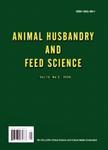Effects of Transport,Storage Temperature and Time on Parthenogenetically Developmental Competence of Sheep Oocyte
Effects of Transport,Storage Temperature and Time on Parthenogenetically Developmental Competence of Sheep Oocyte作者机构:Department of Husbandry and Veterinary Beijing Vocational College of Agriculture Group of Science Technology and IndustryBeijing University of Agriculture Institute of Animal Science and Veterinary MedicineBeijing University of Agriculture Institute of Animal Science( IAS) Chinese Academy of Agricultural Science( CAAS)
出 版 物:《Animal Husbandry and Feed Science》 (动物与饲料科学(英文版))
年 卷 期:2014年第6卷第3期
页 面:138-140页
基 金:Supported by Construction of Natural Science and Technology Platform in China(2005DKA21101) "863"Program(2006AA10Z198) Technical Development and Demonstration Program of Beijing Vocational College of Agriculture(XY-YF-14-20)
主 题:Sheep ovary Storage temperature Transport temperature Oocytc Developmental competence
摘 要:This study was to investigate the effects of transport, storage temperature and time on parthenogenetical developmental competence of sheep oocyte. The ovaries were collected and randomly immersed in physiological saline at ( 10 - 15 ) ℃, (20 - 25 ) ℃ and (30 - 35 ) ℃ and transported to the laboratory for culture. They were divided into three groups randomly in an optimized transport temperature, kept in physiological saline at4 ℃, (14 -18) ℃ and (25 -30) ℃ respectively; 15 - 17 h later, the ovaries were cutured for the maturation and parthenogenetic activation of oocytes. The results showed that the optimal transport temperature of ovaries was 20 -25 ℃, when the maturation rate and blastocysts rate reached 67.44% and 35.93% respectively. Incubating sheep ovaries at ( 14 - 18 ) ℃ for (15 -17) h did not reduce the maturation rate (61.81%) and blastocysts rate (29.03%) of oocyte significantly. However, incubating sheep ovaries at 4 ℃ or (25 -30) ℃ significantly reduced the maturation rate (41.90%, 18.40% ) and cleavage rate (9.09%, 13.04% ), and the ovaries could not develop into blastocysts at these two temperature ranges. It can be concluded that the optimal transport temperature of the sheep ovaries is 20 - 25 ℃, and incubation at 14 - 18 ℃ overnight in vivo does not affect the developmental competence of oocytes.



